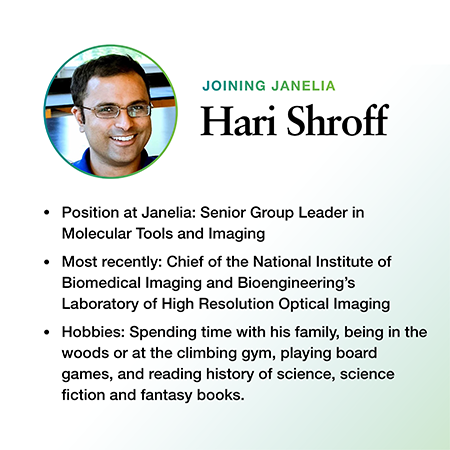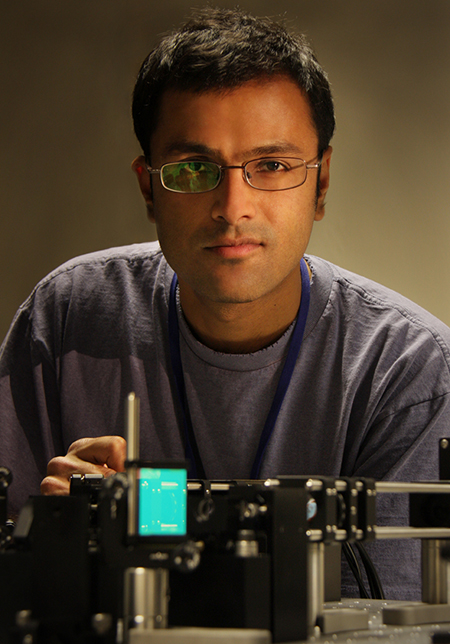Former Janelia postdoc and chief of the National Institute of Biomedical Imaging and Bioengineering’s Laboratory of High Resolution Optical Imaging Hari Shroff joins Janelia as a senior group leader in molecular tools and imaging.
As one of the first postdocs at Janelia, Hari Shroff worked on Nobel Prize-winning super-resolution microscopy techniques developed by Janelia Senior Fellow Eric Betzig and Senior Group Leader Harald Hess.

Now, more than a decade later, Shroff, most recently chief of the National Institute of Biomedical Imaging and Bioengineering’s Laboratory of High Resolution Optical Imaging, is returning to Janelia to again help advance biological imaging.
But this time around, Shroff isn’t out to build a new instrument – he wants to help build a new field. As a senior group leader in Janelia’s Molecular Tools and Imaging research area, Shroff plans to harness the power of machine learning, artificial intelligence, and cell biology to further improve optical microscopy.
At Janelia, Shroff will work closely with experts in imaging, computing, and biology, as well as scientists in Janelia’s Mechanistic Cognitive Neuroscience and 4D Cellular Physiology research areas to push microscopy forward. He hopes that breaking down the silos between these fields will enable biological imaging to catch up with medical imaging, which in some ways is years ahead of its cellular counterpart.
“What I think is really exciting about Janelia is the idea of taking some of the same core principles and then shrinking them down to the basic science scale. That’s exciting to me – the idea of perhaps starting a new field or advancing a core field with a new perspective,” Shroff says. “That’s built into the DNA of Janelia – the idea of trying to do something new and synergistic with other people.”

Shroff describes himself as a tool developer who wants the tools he creates to benefit biologists. A watershed moment came for Shroff in 2006 while attending a physiology course at Woods Hole taught by Janelia Executive Director Ron Vale. That summer’s experience drove home the importance of optical microscopy for cell biology and the dramatic, practical benefit to biology of improving these tools – ideas he honed as he progressed in his career.
At NIH, Shroff and his team developed new imaging tools to study fast cellular processes in 3D and improved super-resolution microscopy techniques. They built microscopes that were commercialized and deployed in hundreds of labs around the world while also setting up a program –much like Janelia’s Advanced Imaging Center – that gives researchers access to microscopes not yet available commercially. In addition, Shroff’s lab group studied brain development in C. elegans. This biological work led the team to develop better live imaging tools, which in turn uncovered new biological insights.
This cyclical approach of using optical microscopes to make biological discoveries and then using biology to motivate better microscopy is one Shroff hopes to continue at Janelia. That includes using machine learning and artificial intelligence to reduce noise to improve image quality, automate image analysis, and understand the vast amounts of data generated by microscopes.
The imaging enabled by microscopes will only go so far, and now scientists need to use computational tools to make progress, Shroff says.
“There are many threads to my research, and I feel like Janelia could be an environment where they all kind of come together in a way that’s very difficult to do at some other institution,” he says. “I think it will be an adventure for me and a chance to reinvent myself a bit and try to do some new things.”
Janelia and Shroff have both changed since the research campus’s early days more than a decade ago, but the core principles of both the institution and the scientist remain the same.
“I get up in the morning and I think about science, and usually when I am ready to go to sleep, I am still thinking about science. So, I like to be in environments where that is encouraged,” Shroff says. “But it’s the doing of science that brings me a lot of personal satisfaction – knowing that I am chipping away and advancing knowledge.”
![]()
Shroff Lab / We invent optical and computational tools to improve fluorescence microscopy. We are passionate about applying our tools to problems of outstanding biological significance.
Joining Janelia
Media Contacts
Nanci Bompey
